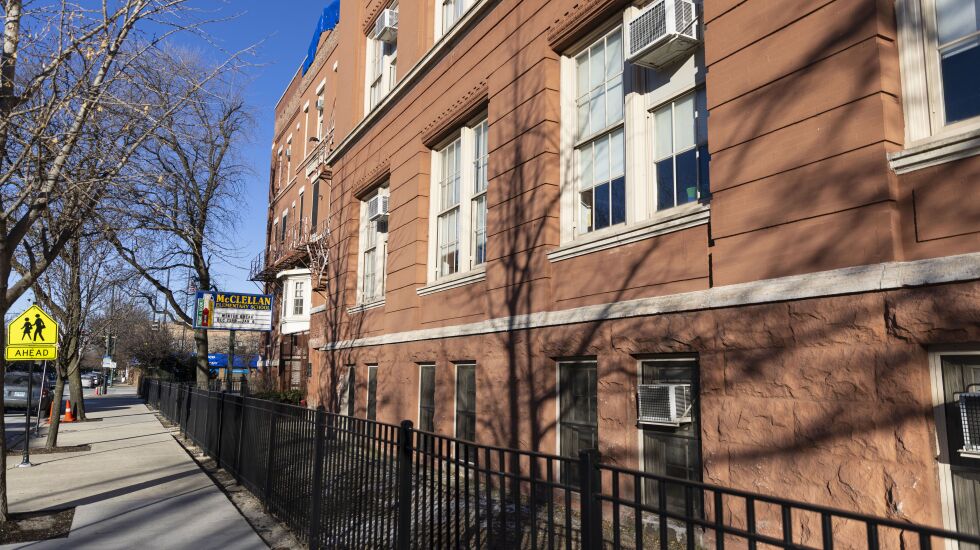
As students return to public schools this week, Chicago Public Schools should embrace the Sun-Times Editorial Board’s recent suggestion and jumpstart robust detection, remediation and support to schools confronting lead contamination.
Chicago Teachers Union members at Bridgeport’s McClellan Elementary had to purchase their own lead tests to expose the danger to medically fragile students because the mayor (who runs our schools) requires students to schedule their own blood tests. Thankfully, pressure from staff and parents forced CPS to invest $35,000 in building repairs over the holiday break. But this is only one school among hundreds.
SEND LETTERS TO: letters@suntimes.com. We want to hear from our readers. To be considered for publication, letters must include your full name, your neighborhood or hometown and a phone number for verification purposes. Letters should be a maximum of approximately 350 words.
CPS admits that lead paint may be present at virtually every school built before 1980, in the face of a $2 billion backlog of desperately needed facilities repairs. Instead of putting more band-aids on deep environmental wounds, CPS should partner with the CTU on a Green Schools plan that tackles safety for every student.
The need is dire.
Black and Latino school communities have higher levels of cumulative impact from environmental toxins than the city’s more affluent neighborhoods. Three schools in working-class McKinley Park — Everett, Evergreen and Kelly — are a mile from controversial MAT Asphalt, whose operators are seeking a $500 million city contract amid hundreds of complaints from residents. The neighborhood has the greatest density of environmental toxins and air pollution in Chicago.
Three Altgeld Gardens schools — Carver, Aldridge and Carver Military — are in a ‘toxic donut’ of 50 landfills and nearly 400 industrial facilities. Thousands of low-income Black children and families — including 20% of neighborhood students without permanent housing — face disproportionate exposure to DDT, PCBs, PAHs, heavy metals, xylene and more.
Washington High School’s students, educators and community residents had to fight for years to prevent metal shredder General Iron, with its long history of environmental violations, from moving from affluent Lincoln Park to the environmentally overburdened Southeast Side.
There’s a better way. We need a collaborative, equitable Green Schools Plan in every community — where school communities, residents, elected leaders and policymakers work together to protect the health of every school community member.
We urge CPS to join us in creating such a plan to prioritize billions authorized for building upgrades. The longer the mayor and the Board of Education delay, the more they actively put our most burdened school communities in harm’s way.
A Green Schools Plan will create healthy, sustainable buildings that conserve energy, reduce schools’ ecological footprint and protect the health of students, educators and families. CPS can start by working with us on schools with the highest environmental burdens and greatest health risks. Let’s get to it.
Lauren Bianchi, teacher, George Washington High School, chair of CTU Climate Justice Committee; Ayesha T. Qazi-Lampert, teacher, Northside College Prep, CTU Climate Justice Committee
Trump’s tax returns about ethics
Jacob Sullum’s column on Trump’s tax returns was well-reasoned and clearly written. However, he misses the larger point about the high calling of public service. The “dangerous precedent” he and Republicans keep harping on is not the demand for documents by a legislative branch legally empowered for oversight of the executive. The real danger, the worrisome precedent, is Donald Trump’s refusal to release his taxes, when all presidents of the modern era have done so.
While tax law and statutes can be confusing and labyrinthine, ethics are not. They are fundamentally transparent and absolutely essential to the functioning of a healthy and vigorous democracy. While the right to privacy is a time-honored American value, citizens have a right to know the reality of a candidate for public office, not just the spin of a campaign apparatus. Candidates and office holders should understand and agree that the need for financial transparency is, and should be, higher in governmental service than in private commerce.
Citizens have a right to know if someone in public office, with its attendant power and prestige, has troubling private and/or public entanglements that could compromise his/her decisions in office. We need to know who “butters the bread,” or, conversely, who may be able to pressure, deal or extort for lucrative contracts or favors. “A legitimate legislative purpose” is overseeing the functioning and, yes, ethics of the executive branch. And a legitimate and compelling reason for presidents and members of Congress to be forthright with their financial records is the need for rigorous ethics in government.
The desire to enrich oneself is normal in a capitalistic system. That desire, when brought into government, turns too easily into corruption and abuse of power. A very slippery slope. Secrecy and hidden money agendas do not fit democracy’s need for light and transparency.
Yes, privacy should be protected. But ethics? Even more so. They are the heartbeat and lifeblood of democracy.
Jane Artabasy, Glencoe







